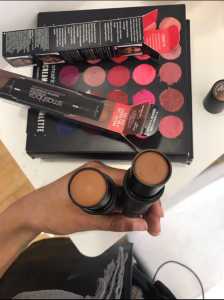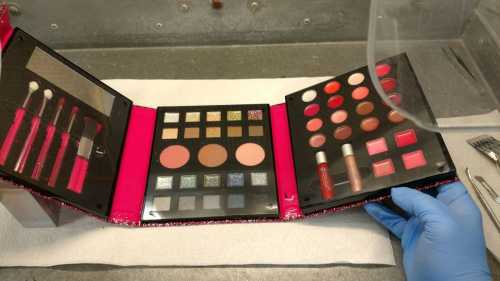Store makeup tester samples revealed harmful bacteria, including E. Coli
A good reason not to try out makeup testers in the store: "You could literally be applying and smearing someone else's fecal matter directly onto your lips," dermatologist Dr. Whitney Bowe said. That's gross even if it's not on your lips. And, "You can catch the herpes simplex virus from an inanimate object such as lipstick. In fact, that virus can survive on the surface of a lipstick tube for up to a week." A woman is suing Sephora, claiming she "got the herpes virus from sampling lipstick," "without warning of the risk of getting herpes and other diseases" from trying on makeup samples at the store.
The Rossen Reports team went undercover at 3 popular makeup stores - Sephora, Macy's, and Ulta - to collect samples of makeup testers with sterile swabs, and then sent them to a certified microbiology lab for testing. At all 3 stores some make-up samples came back with harmful baceria, including E. coli and Klebsiella pneumoniae - two types of bacteria found in the intestinal tract that are expelled with feces. Hence Dr. Bowe's "fecal matter on your lips" comment. Some samples also tested positive for Staphylococcus aureus, which can cause very serious infections, boils and lesions, especially if you have an open cut on your skin or lips, or it gets in your eyes.
Comments from the stores:
Sephora told NBC News "the health and safety of our clients is our foremost priority" and their "testers are regularly sanitized, replaced and replenished." They also said they follow "best practices in our stores" and "offer many other ways for clients to test products."
Ulta said, "The health and safety of our guests is a top priority … We encourage and support sanitary trial by offering items like cleansers and disposable makeup applicators...."
Macy's declined to comment.
Good advice to follow is to not try the makeup in the store, look - don't touch when you are buying. Or, if you really want to try it, at least use it on your hand, making sure to not have any open cuts, or even compromised skin (i.e. dry, itchy, and flaky skin, skin that no longer has the ability to protect and maintain itself and is vulnerable to problems).
(via NBC News, "Beware store makeup samples that may harbor hidden bacteria")
You certainly don't want to use the makeup testers directly on your face in a "makeup emergency". This isn't news. Published in 2004, "What's On Your Face?":
After two years of testing makeup samples from 20 makeup companies in a double blind study, Rowan University biological sciences professor Dr. Elizabeth Brooks and biological sciences student Heather Ragozine, a senior from Marlton, N.J., found that makeup samples taken at different periods showed between 67 and 100 percent gross bacterial contamination. That means between 67 and 100 percent of the products showed at least some level of contamination, though the levels may have varied from product to product.
The Rowan team conducted up to four sampling "runs" at makeup counters on Fridays, Saturdays and Sundays during the two-year period. During those runs, they used sterile swabs to take samples of 22 to 27 products, including skin, eye and lip makeup, that were used by women to try on "open" makeup samples before purchasing packaged products. The team used the swabs to transfer the makeup to a container of agar, a substance on which cultures can grow.
Their results showed:
Fridays/Two runs/67 percent contamination
Saturdays/Two runs/80 percent contamination
Sundays/Four runs/100 percent contamination
Brooks, who in addition to teaching biological sciences is a podiatrist, said generally what the team uncovered was staph aurus. Brooks said that bacteria can be found on human skin and generally is not a health concern; however, she said, it can become problematic if it is introduced to the eyes, nose or mucous membranes.
"It certainly is not hygienic even if it is not a huge health concern," she said. "If it got into eyes, someone could get bacterial conjunctivitis. It's certainly not a risk we should be taking for makeup."
Yuck! Pretty gross. Or better yet, do some no makeup days - better for your skin.



 Report a concern
Report a concern

 Add Comment
Add Comment



